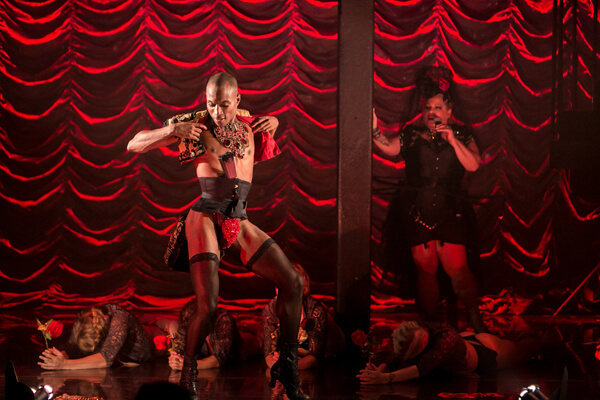Judith Light in Neil LaBute’s “All the Ways to Say I Love You,” at the Lucille Lortel through October 23. | JOAN MARCUS
Intellectual sloppiness in the service of theatricality, unfortunately, is nothing new in on stage. Playing into the emotional biases, real or presumed, of an audience can be effective in political theater or agitprop, but in realistic, narrative-based plays, goading them with triggers rather than moving them with character and situation is the easy — and often unsatisfying — way out.
That’s the problem with two new plays, “All the Ways To Say I Love You” from MCC and “Nat Turner in Jerusalem” at New York Theater Workshop. The playwrights in both cases, Neil LaBute and Nathan Alan Davis, respectively, have seized on hot button issues but sadly done little with them.
The LaBute piece is a monologue in which a high school teacher, Mrs. Johnson, confesses she had an affair with a student and discusses the consequences she has suffered for that choice. The play feels like a series of character sketches strung together. At one point, Mrs. Johnson is reveling in the passion she felt for the first time in a long time. Later, she goes off on a lengthy tangential rant about being part of a mixed race couple. There are also reflections on what one person does for another in a relationship and on the selfish frustration someone feels when they don’t get their way.
Two sprawling, unfocused plays fall flat
LaBute has made a career of being a provocateur, playing with incendiary issues in such pieces as “Fat Pig” and “Reasons to Be Pretty.” Those plays were more Shavian in their polemics, even with their gritty subject matter. In each, the audience was drawn into the world of the play and its arguments. “All the Ways to Say I Love You,” instead, is a confrontational assault, another way to challenge an audience, to be sure, but here ineffective because Mrs. Johnson never emerges as a believable human character. She is a device for LaBute to go off on a variety of topics.
The central question Mrs. Johnson asks at the outset, “What is the weight of a lie?” has a quasi-philosophical bent, but the answer she ultimately gives is cute and facile. In fact, the denouement seems to make a joke out of the question itself, rending what preceded trivial.
Still, if you’re going to have a character be a mere device, you could have no one better to bring it off than Judith Light. She is in this, as in everything, the consummate actor. What life Mrs. Johnson has and whatever we feel for her result from Light’s ability to animate her. She is a fearless actress who commands the stage, whether boldly proclaiming the character’ sexuality or dripping with resentment over the choices she has made. Some of the transitions between the stories are rough, motivated by nothing other than the script, but Light does the best she can with them, and that almost compensates for the ragged nature of the play.
Rowan Vickers and Phillip James Brannon in Nathan Alan Davis’ “Nat Turner in Jerusalem” at New York Theatre Workshop through October 16. | JOAN MARCUS
“Nat Turner in Jerusalem” has a different set of problems. The story takes place in the jail cell of Nat Turner, the night before he is to be hung for his role in the 1831 slave rebellion. He is visited by a man named Thomas Gray, who wrote the original “Confessions of Nat Turner,” and also by a guard with whom Tuner tries to develop some sort of camaraderie. Gray, a struggling lawyer, wants Turner to give him intelligence about other slave rebellions planned. Turner maintains he doesn’t know and is prepared to go to his death a martyr, repeating multiple times the religious experience that provoked him to lead the uprising.
Davis aims to draw parallels between the slave rebellion and today’s Black Lives Matter movement, but he never really develops the argument here. The attitudes you bring into the theater are the ones you’ll leave with. Nothing happens in this play to force you to see things differently. The only moment of visceral power comes when Turner tells Gray that while he doesn’t know when or where, the uprisings will keep happening until the sin of slavery is resolved.
There is a lot of talking, but it’s mostly meditative meandering. At one point Turner says, “I am weary of talking in circles.” That’s the other true moment in the piece, and, in fact, a lot of the time it’s virtually impossible to know what Turner is talking about.
The piece’s haziness isn’t helped by Megan Sandberg-Zakian’s plodding direction. Phillip James Brannon gives a muted performance as Turner, working with a limited emotional range that is an apparent choice. Turner is quietly accepting of his fate at the beginning and the end of the play. His long speeches exist for their own sake, and while slouching toward poetry, they take us nowhere. Rowan Vickers plays Gray and the guard, and does well enough with the meager material he’s given to work with.
Theater can be powerful and provocative. It can challenge beliefs and perceptions, but if it’s going to be viable the playwright, not the audience, must do the work.
ALL THE WAYS TO SAY I LOVE YOU | MCC at the Lucille Lortel Theatre, 121 Christopher St., btwn. Bedford & Bleecker Sts. | Through Oct. 23: Tue.-Wed., Sun. at 7 p.m.; Thu.-Sat. at 8 p.m. | Sat. at 2 p.m.; Sun. at 3 p.m. | $69-$125 at ovationtix.com or 866-811-411 | One hr., no intermission
NAT TURNER IN JERUSALEM | New York Theatre Workshop | 79 E. Fourth St., btwn. Bowery & Second Ave. | Oct. 13-14 at 8 p.m.; Oct. 15 at 2 & 8 p.m.; Oct. 16 at 2 & 7 p.m. | $69 at nytw.org | Ninety mins., no intermission




































